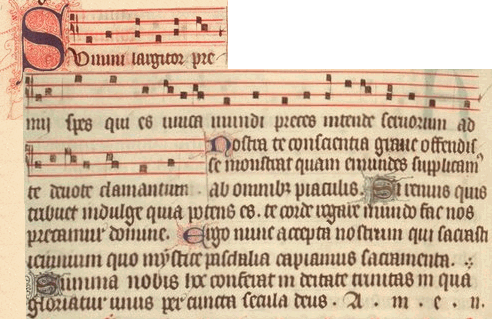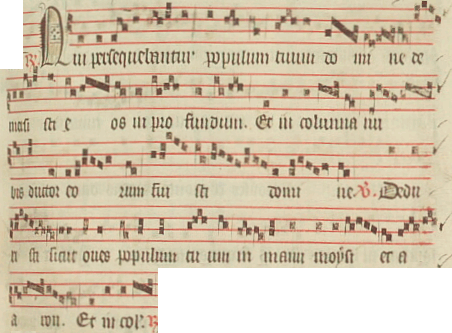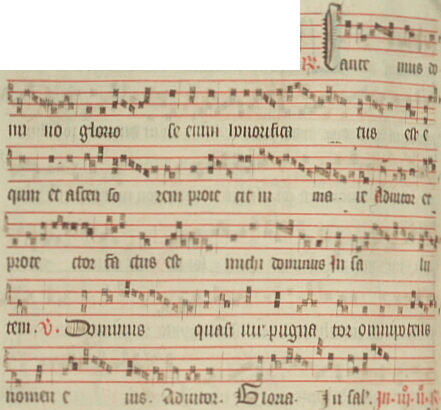READINGS: LENT SUNDAY III

Invitatory Psalm & BACK

PSALMS and BACK
והאכילתהו לחם שכל — ומי תבונה תשקנו
Even Years: Exodus 22:19—23:9 זֹבֵחַ לָאֱלֹהִים יָחֳרָם בִּלְתִּי לַיהוָה לְבַדּוֹ׃ וְגֵר לֹא־תוֹנֶה וְלֹא תִלְחָצֶנּוּ כִּי־גֵרִים הֱיִיתֶם בְּאֶרֶץ מִצְרָיִם׃ כָּל־אַלְמָנָה וְיָתוֹם לֹא תְעַנּוּן׃ אִם־עַנֵּה תְעַנֶּה אֹתוֹ כִּי אִם־צָעֹק יִצְעַק אֵלַי שָׁמֹעַ אֶשְׁמַע צַעֲקָתוֹ׃ וְחָרָה אַפִּי וְהָרַגְתִּי אֶתְכֶם בֶּחָרֶב וְהָיוּ נְשֵׁיכֶם אַלְמָנוֹת וּבְנֵיכֶם יְתֹמִים׃ אִם־כֶּסֶף תַּלְוֶה אֶת־עַמִּי אֶת־הֶעָנִי עִמָּךְ לֹא־תִהְיֶה לוֹ כְּנֹשֶׁה לֹא־תְשִׂימוּן עָלָיו נֶשֶׁךְ׃ אִם־חָבֹל תַּחְבֹּל שַׂלְמַת רֵעֶךָ עַד־בֹּא הַשֶּׁמֶשׁ תְּשִׁיבֶנּוּ לוֹ׃ כִּי הִוא כְסוּתָה לְבַדָּהּ הִוא שִׂמְלָתוֹ לְעֹרוֹ בַּמֶּה יִשְׁכָּב וְהָיָה כִּי־יִצְעַק אֵלַי וְשָׁמַעְתִּי כִּי־חַנּוּן אָנִי׃ אֱלֹהִים לֹא תְקַלֵּל וְנָשִׂיא בְעַמְּךָ לֹא תָאֹר׃ מְלֵאָתְךָ וְדִמְעֲךָ לֹא תְאַחֵר בְּכוֹר בָּנֶיךָ תִּתֶּן־לִּי׃ כֵּן־תַּעֲשֶׂה לְשֹׁרְךָ לְצֹאנֶךָ שִׁבְעַת יָמִים יִהְיֶה עִם־אִמּוֹ בַּיּוֹם הַשְּׁמִינִי תִּתְּנוֹ־לִי׃ וְאַנְשֵׁי־קֹדֶשׁ תִּהְיוּן לִי וּבָשָׂר בַּשָּׂדֶה טְרֵפָה לֹא תֹאכֵלוּ לַכֶּלֶב תַּשְׁלִכוּן אֹתוֹ׃ לֹא תִשָּׂא שֵׁמַע שָׁוְא אַל־תָּשֶׁת יָדְךָ עִם־רָשָׁע לִהְיֹת עֵד חָמָס׃ לֹא־תִהְיֶה אַחֲרֵי־רַבִּים לְרָעֹת וְלֹא־תַעֲנֶה עַל־רִב לִנְטֹת אַחֲרֵי רַבִּים לְהַטֹּת׃ וְדָל לֹא תֶהְדַּר בְּרִיבוֹ׃ כִּי תִפְגַּע שׁוֹר אֹיִבְךָ אוֹ חֲמֹרוֹ תֹּעֶה הָשֵׁב תְּשִׁיבֶנּוּ לוֹ׃ כִּי־תִרְאֶה חֲמוֹר שֹׂנַאֲךָ רֹבֵץ תַּחַת מַשָּׂאוֹ וְחָדַלְתָּ מֵעֲזֹב לוֹ עָזֹב תַּעֲזֹב עִמּוֹ׃ לֹא תַטֶּה מִשְׁפַּט אֶבְיֹנְךָ בְּרִיבוֹ׃ מִדְּבַר־שֶׁקֶר תִּרְחָק וְנָקִי וְצַדִּיק אַל־תַּהֲרֹג כִּי לֹא־אַצְדִּיק רָשָׁע׃ וְשֹׁחַד לֹא תִקָּח כִּי הַשֹּׁחַד יְעַוֵּר פִּקְחִים וִיסַלֵּף דִּבְרֵי צַדִּיקִים׃ וְגֵר לֹא תִלְחָץ וְאַתֶּם יְדַעְתֶּם אֶת־נֶפֶשׁ הַגֵּר כִּי־גֵרִים הֱיִיתֶם בְּאֶרֶץ מִצְרָיִם׃ | 19 Anyone who sacrifices to other gods will be put under the curse of destruction. 20 You will not molest or oppress aliens, for you yourselves were once aliens in Egypt. 21 You will not ill-treat widows or orphans; 22 if you ill-treat them in any way and they make an appeal to me for help, I shall certainly hear their appeal, 23 my anger will be roused and I shall put you to the sword; then your own wives will be widows and your own children orphans. 24 If you lend money to any of my people, to anyone poor among you, you will not play the usurer with him: you will not demand interest from him. 25 If you take someone's cloak in pledge, you will return it to him at sunset. 26 It is all the covering he has; it is the cloak he wraps his body in; what else will he sleep in? If he appeals to me, I shall listen. At least with me he will find compassion! 27 You will not revile God, nor curse your people's leader. 28 Do not be slow about making offerings from your abundance and your surplus. You will give me the first-born of your children; 29 you will do the same with your flocks and herds. For the first seven days the first-born will stay with its mother; on the eighth day you will give it to me. 30 'You must be people consecrated to me. You will not eat the meat of anything in the countryside savaged by wild animals; you will throw it to the dogs. 23:1 You will not spread false rumours. You will not lend support to the wicked by giving untrue evidence. 2 You will not be led into wrong-doing by the majority nor, when giving evidence in a lawsuit, side with the majority to pervert the course of justice; 3 nor will you show partiality to the poor in a lawsuit. 4 If you come on your enemy's ox or donkey straying, you will take it back to him. 5 If you see the donkey of someone who hates you fallen under its load, do not stand back; you must go and help him with it. 6 You will not cheat the poor among you of their rights at law. 7 Keep clear of fraud. Do not cause the death of the innocent or upright, and do not acquit the guilty. 8 You will accept no bribes, for a bribe blinds the clear-sighted and is the ruin of the cause of the upright. 9 You will not oppress the alien; you know how an alien feels, for you yourselves were once aliens in Egypt. | ||
Odd Years: Hebrews 1:1-14 πολυμερῶς
καὶ
πολυτρόπως
πάλαι ὁ θεὸς
λαλήσας τοῖς
πατράσιν ἐν
τοῖς
προφήταις
1 At many moments in the past and by many means, God spoke to our ancestors through the prophets; but 2 in our time, the final days, he has spoken to us in the person of his Son, whom he appointed heir of all things and through whom he made the ages. 3 He is the reflection of God's glory and bears the impress of God's own being, sustaining all things by his powerful command; and now that he has purged sins away, he has taken his seat at the right hand of the divine Majesty on high. 4 So he is now as far above the angels as the title which he has inherited is higher than their own name. 5 To which of the angels, then, has God ever said: You are my Son, today I have fathered you, or: I shall be a father to him and he a son to me? 6 Again, when he brings the First-born into the world, he says: Let all the angels of God pay him homage. 7 To the angels, he says: appointing the winds his messengers and flames of fire his servants, 8 but to the Son he says: Your throne, God, is for ever and ever; and: the sceptre of his kingdom is a sceptre of justice; 9 you love uprightness and detest evil. This is why God, your God, has anointed you with the oil of gladness, as none of your rivals. 10 And again: Long ago, Lord, you laid earth's foundations, the heavens are the work of your hands. 11 They pass away but you remain, they all wear out like a garment. 12 Like a cloak you will roll them up, like a garment, and they will be changed. But you never alter and your years are unending. 13 To which of the angels has God ever said: Take your seat at my right hand till I have made your enemies your footstool? 14 Are they not all ministering spirits, sent to serve for the sake of those who are to inherit salvation?
| | ||
Even Years: Bernard of Clairvaux, The levels of humility and pride, III:6
Odd Years: John Chrysostom, Homily 2 on Hebrews, 3 (PG 63, 23.24-25)
|
GOSPELS FOR THE THREE CYCLES
*A* , *B* , *C*
| Prayer |

